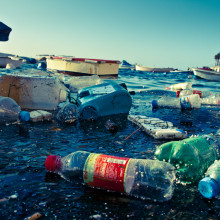Could we clean up our oceans of plastics by fitting vacuum cleaners to ships to suck them up?
In this episode

Vacuum cleaners to clear ocean plastic?
Khalil - I guess the ocean could do with a bit of a spring clean. One person who knows a great deal about marine pollution is Professor Peter Franks of the Scripps Institution of Oceanography. I floated the question past him.
Peter - Coincidentally, there's an instrument that does exactly what you propose. It's called CUFES or Continuous Underway Fish Egg Sampler. It's a big tube attached to the side of a ship that sucks up water which is then processed through a series of sieves to separate the fish eggs for sorting and counting by the scientists.
Khalil - That's convenient. It appears this is going to be a rather short edition of Question of the Week or is it?
Peter - It turns out that it's an incredibly inefficient way to get the plastic out of the ocean. The ocean is huge and systems such as these sample in insignificantly tiny fraction of it. Even if all the ships in the world had such systems, it would not make any difference to the amount of plastic in the ocean and increased fuel usage due to the drag of the system would increase the CO2 being pumped into the atmosphere, enhancing global climate change.
Khalil - Okay, it looks like ship-based cleaning is out of the question then. But what about a purpose-built floating vacuum cleaner?
Peter - There have been several proposals to do this. The problem is that most of the plastic in the ocean is in tiny particles, about the same size as the plankton - the tiny organisms that live in the ocean, so any attempt to suck up the plastic will also suck up the plankton.
Khalil - Plankton is a crucial part of the marine food web, providing food for organisms as small as shrimp and as big as whales. Messing with the plankton could throw the entire ecosystem out of kilter - not good. Using charged electrodes will be problematic too as salt water has a habit of corroding metals extremely effectively, especially when they've got an electric charge. We also don't know what effects the electricity might have on plankton and other sea life.
Peter - That being said, it might be possible to drag lines behind ships to recover lost fishing nets and larger plastic items. Though this wouldn't solve the problem of the tiny plastic particles in the ocean, it might help to reduce ghost fishing by those lost nets.
Khalil - Ghost fishing is a problem caused by abandoned fishing nets and lines which drift around the ocean, trapping and killing organisms indiscriminately. Removing these would certainly help protect ocean dwellers from this grim fate.
Peter - The problem is that such systems will always affect the organisms of the ocean one way or another. The better solution of course would be to stop putting plastic into the ocean, or anywhere else for that matter.
- Previous Nano-Scale Quill Pen
- Next Super-slippery, water repellent surfaces









Comments
Add a comment